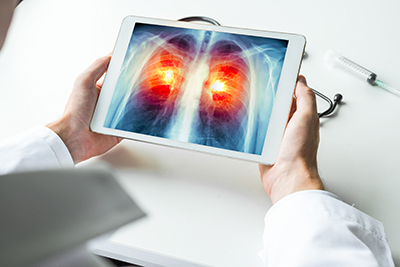Lung cancer is the second most common cancer in both men and women. It is the leading cause of cancer death among both men and women.
Each year, more people die of lung cancer than colon, breast and prostate cancers combined.
Lung cancer is more treatable when identified at an early stage. Unfortunately, symptoms do not often present in early lung cancer, making it difficult to recognize there is a problem. By the time most people are diagnosed, the cancer has spread and is at an advanced stage, making it difficult to treat and/or cure. Fortunately, medical advances over the past few years have given us the opportunity to find a better solution.
In 2015, Harrington joined a growing list of organizations across the nation who are participating in an Early Detection Lung Cancer Screening Program to identify at-risk patients sooner. The comprehensive program engages the patient, physician and radiologist. Since the program’s inception, Harrington has performed over 2,800 lung screenings. We are on track to finish 2018 with more than 1,000 completed lung screenings.
Talk with your Primary Care Physician to see if you are a candidate for our Early Detection Screening Program. A physician referral is required. To learn more, call (508) 765-3024.

Step 1: The Screening
A lung cancer screening consists of a CT scan that allows physicians to look at a detailed picture of your lungs to detect any abnormalities. A CT scan is the only proven, effective way to screen for lung cancer.
The identified highest, at-risk patient population who should be screened are those who:
Low-dose CT scans expose people to an extremely low level of radiation. The test is painless and takes less than 10 minutes to complete.
Step 2: Review What’s Next
Lung scans are categorized as RAD 1-4, with 1 being negative and 4 being highly suspicious with additional testing(s) recommended.
As developed by the American College of Radiology, Lung-RADS™ is a quality assurance tool designed to standardize lung cancer screening CT reporting and management recommendations, reduce confusion in lung cancer screening CT interpretations, and facilitate outcome monitoring.*
If your results show an abnormality, you will meet with your doctor who will discuss the findings and the next steps in your individualized care plan. As with any screening test, there is the possibility of a false positive result. Abnormal findings may require additional testing.
In 2017, Harrington performed over 900 early detection lung cancer screenings. Of those, nearly 20 percent were classified as Rad3 or Rad4.
There are a number of risk factors for lung cancer. Not surprisingly, smoking remains the number one cause, responsible for about 87 percent of cases. Tobacco smoke contains more than 60 carcinogens.
Surprisingly, though, having a family history does not rank as being one of the most influential reasons for cancer to develop. Instead, the second leading cause of lung cancer is Radon exposure. Radon is a colorless, odorless, radioactive gas that occurs naturally in soil. One out of every 15 homes in the United States has a radon problem. Additional potential causes of lung cancer include particle pollution, hazardous chemicals and genetic factors.
When detected early, lung cancer patients have more treatment options and a far greater chance of survival. The 5-year survival rate for those diagnosed before the cancer has spread rises from 18 out of every 100 people to 55 out of every 100. The key is early screening for lung cancer.
Jean Comeau, RN, BSN, is an interventional radiology nurse and the nurse navigator for Harrington’s Lung Screening Program in Southbridge. For questions regarding the program, call (508) 765-3024.
*https://www.acr.org/Clinical-Resources/Reporting-and-Data-Systems/Lung-Rads
© 2024 UMass Memorial Health